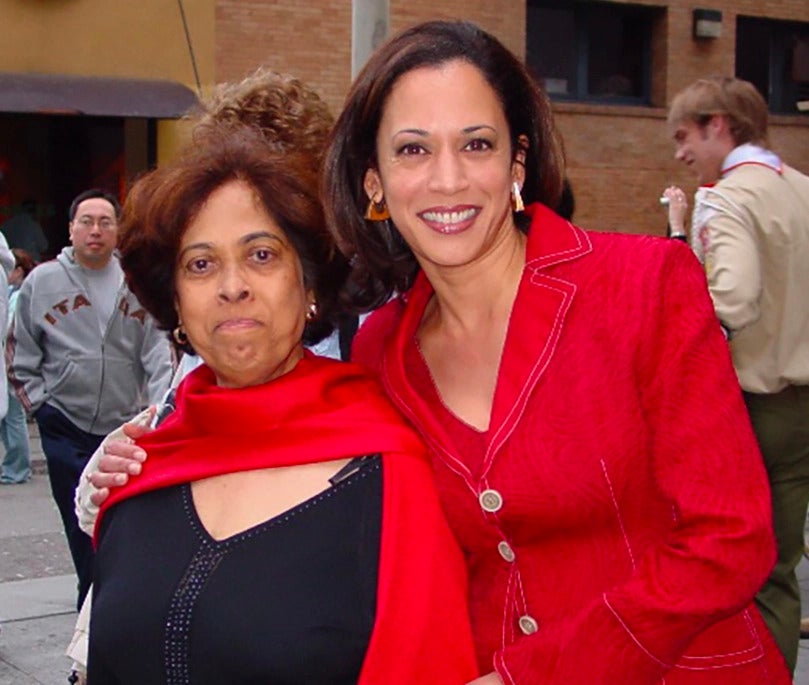How dare Trump think he gets to decide whether Kamala Harris can call herself Black or Indian
Donald Trump’s suggestion that his opponent identified as Indian for years and then ‘happened to turn Black’ is more than just politically cynical, says Ava Vidal


Yet again, shots have been fired at Donald Trump – this time, over his comments about Kamala Harris’s racial heritage.
On Wednesday, Trump bewildered an audience of Black journalists in Chicago by telling them that the Kamala Harris he claims to have known for several years was “Indian all the way” before, “all of a sudden, she made a turn and she went… she became a Black person”.
It won’t come as a massive surprise to anyone that race is one of those topics that, every time Trump brings it up, he inserts his great big clodhoppers into his mouth. And, once again, by suggesting that Harris “only recently” changed her identity and became a Black woman, he has got this all so, so wrong.
But, in fairness to the Orange Peril, he is not the only one.
There has been much debate in the US about the Democrats’ presumptive presidential candidate and her heritage precisely because it is not African-American. (One might hope that, post-Barack Obama, the world would be able to cope with a White House candidate of dual heritage, but here we are.)
Unlike former president Obama – who at least had a white American mother and grandparents who raised him – Harris has no direct American heritage whatsoever. Her mother hails from Chennai (formerly Madras) in India, while her father immigrated to the United States from Jamaica.
Her parents divorced when she was very young, and she was raised mainly by her sari-wearing mother in what many describe as a traditionally Indian upbringing. But the fact is, it doesn’t only matter what was going on at home, it also matters how society views her – which is why her mother raised her to identify as Black. And this is where it gets complicated. Especially for her Republican opponents.
Now, people like me have been known to get upset when strangers ask the loaded question: “Where are you from?” Because I know if I say London, they will only become frustrated and follow up with: “No, where are you really from?”
But we need to spare a thought for people of mixed heritage, such as my oldest nephew, who simply get asked: “What are you?”
I have three mixed-race nephews. The younger two have unmistakeable afro hair, and there is no doubt that they have at least one Black parent – but my eldest nephew is what we fondly refer to these days as “racially ambiguous”. Depending on the length of his hair, and how much sun he happens to have caught, he can be mistaken for anything from Italian to South Asian.
There is no mistaking what the former president was up to when he weaponised Harris’s racial heritage – to gasps and incredulous laughter from the invited Black audience. But Trump is not the only person pointing out that, early on in Harris’s career, she “identified” as Indian. Candace Owens, the Black conservative podcaster, has dedicated hours of time to the subject, accusing Harris of only claiming to be Black now because wants to secure the Black vote.
Despite Owens being almost universally hated by the African-American community, there are more than a few who agree with her. Many have taken to social media to declare they won’t be voting for Harris because “she is not Black”. Prominent Black commentators like Tariq Nasheed and Harvard graduate Kimberly Foster, whose For Harriet blog “celebrates the fullness of Black womanhood”, have been busy dissecting Harris’s heritage online.
Owens seems mortally offended that Harris invited Megan Thee Stallion to her star-studded Atlanta rally, complaining that it is this kind of pandering that reeks of inauthenticity. She accuses Harris of trying to connect with Black people using stereotypes, saying: “Have you seen her husband? Have you seen her family? There is no one in that household that is listening to Megan Thee Stallion, least of all her.”
Harris’s husband Doug Emhoff is Jewish. He has two white children from a previous relationship that she has helped raise. Apart from the fact that the main consumers of hip-hop are middle class white kids, it’s a little unfair to criticise Harris for not listening to Megan. At the age of 59, she shoudn’t be. Katy Perry performed for Hillary Clinton, and I doubt that means Hillary plays her tired, feminism-lite pop music when she’s getting ready in the morning. Actually, that was probably a bad example. I could totally see Hillary listening to “Roar” before she goes down to face Bill at the breakfast table.
But if you think the Indian and Black Jamaican thing was complicated, Harris was recently “outed” by the Daily Mail as being the great-great-great-great-granddaughter of a notorious Irish slave owner. This isn’t the gotcha they think it is.
The reason that so many Caribbean people, including myself, have white heritage is for the simple reason that slave owners would rape their slaves. The poisonous legacy of chattel slavery has had long-lasting ramifications and, as descendants, our heritage is complicated. African-Americans also often have white heritage because of this reason.
Precisely because this kind of sexual abuse in slavery times was so far reaching, in the early 20th century many US states introduced the “one-drop rule”. It codified into law the idea that any person with one ancestor of Black ancestry is considered Black (and then became the accepted national definition). This was done in part to prohibit interracial relationships and thus keep whites “pure” – hence the "one-drop" injunction – but also to prevent mixed slaves from inheriting their father’s property, ensuring it remained in white hands.
If Harris wanted to call herself Indian one day and Black the next, she is entitled to do so – it’s her heritage, and hers to enjoy. But it would be storing up trouble because, socially, it doesn’t make any sense to do so.
Fun fact: if her parents had chosen to raise her in the Caribbean, as a person with mixed Indian heritage, she would have likely been referred to by the offensive terms “coolie” or “doula”. For, after slavery ended, South Asian people were brought in as indentured servants; mixed-race people like Harris were often ostracised and killed by their South Asian relatives, who believed their Black side made them demons. The fact is Black people occupy a unique space because anti-Blackness is found in every single society in the world.
Harris read law at Howard, a historically Black university. These only exist because, in a society that often rejected them, they had to build their own and educate themselves. There are no historically Indian colleges – but after seeing the white supremacist attacks on Usha Vance, the Yale-educated, Indian-American wife of Trump’s running mate JD Vance, they may well establish some soon.
I’d be interested to see how Trump refers to Vance’s children, who are ethnically every bit as much Indian as Harris. Their grandad hails from the same corner of southeast India as Harris’s mother.
On second thoughts, knowing how hard Trump finds it to bite his tongue on racial matters and just let live, it’s probably better we don’t know.






Join our commenting forum
Join thought-provoking conversations, follow other Independent readers and see their replies
Comments